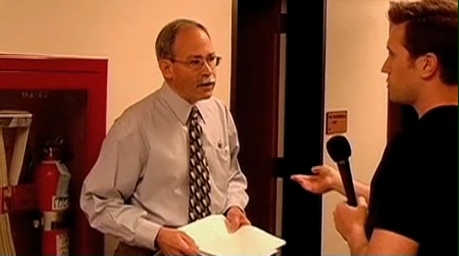« Who the #$&% Is Jackson Pollock? (2006) – Movie Review | Home | John Adams (2008) – Miniseries Review »
Indoctrinate U (2007) – Movie Review
By Robert L. Jones | June 24, 2008

Muckraking director Evan Coyne Maloney ambushes yet another university administrator, insidiously demanding accountability
“Othering” Conservatives
[xrr rating=4/5]
Indoctrinate U. Featuring Ahmad al-Qoloushi, Jay Bergman, Michael Berube, Kelly Coyne, Laura Freberg, Steve Hinkle, Noel Ignatiev, Robert Jervis, K.C. Johnson, Sukhmani Singh Khalsa, Evan Coyne Maloney, John McWhorter, Michael Munger, Daniel Pipes, Glenn Reynolds, Stanley Rothman, Carol Swain, Mason Weaver, Vanessa Wiseman, and Mary Yoder. Camerawork by Oleg Atbashian, Alexandra Barker, Stuart Browning, Jill Butterfield, Laura Cauley, Jared Lapidus, Evan Coyne Maloney, and Mark Xue. Designed and edited by Chandler Tuttle. Editing and music by Blaine Greenberg. Written and directed by Evan Coyne Maloney. (Moving Picture Institute/On the Fence Films, 2007, color, 87 minutes. MPAA rating: not rated.)
As I don’t equate a movie’s budget with its worth, please don’t take it as a sobriquet that young director Evan Coyne Maloney’s recent documentary Indoctrinate U has a low-budget feel to it. The entry-level graphics and obviously shoestring budget somehow lend a sense of authenticity to this excellent slam at the stifling atmosphere of Political Correctness, which has obscured free inquiry and expression on America’s college campuses in recent decades. As Maloney goes from campus to campus searching for just one administrator who’ll speak to him and his camera operator, his cordial, easygoing demeanor and youthful appearance give the viewer the impression that Maloney himself is not too far removed from his own school days.
This documentary, co-produced under the aegis of Thor Halvorssen’s maverick Moving Picture Institute—a pro–free market, nonprofit filmmaking organization—is in fact an expanded version of Maloney’s 2004 short documentary Brainwashing 101. His exposé of the outrageous censorship, character assassination, unsolicited propagandizing, and administrative cowardice that typify today’s campus environment left me with one overwhelming thought: “So, what else is new?”
The kinds of examples Maloney gives to show the radical left’s outright arrogance in silencing any opposition to its academic monopoly could have been found in any of numerous books that have been published on the topic during the PC decade, such asTenured Radicals: How Politics Has Corrupted Our Higher Education (1990) by Roger Kimball, Illiberal Education: The Politics of Race and Sex on Campus (1998) by Dinesh D’Souza, and The Shadow University: The Betrayal of Liberty on America’s Campuses(1999) by Alan Charles Kors and Harvey A. Silverglate. Adults of my generation, who attended college during the late 1980s and early 90s—when the term “political correctness” became commonly used—are even looking upon the 1994 comedy PCU with a nostalgic eye. With the era of PC gone the way of Warrant and Nirvana, what’s Maloney’s beef, anyhow?
Well, for one, on America’s college campuses, political correctness hasn’t gone away, it’s only gotten worse. In fact, the Duke University lacrosse team “rape” case of 2006-07 is the most widely publicized instance of PC run amok, given national media coverage for a solid thirteen months. Three team members were accused by black stripper Crystal Gail Mangum of raping her at a party in March 2006. Throughout the coverage, the accuser was repeatedly referred to in the media as “the victim.” Further, Durham County North Carolina district attorney Mike Nifong encouraged a kangaroo court atmosphere and egged on the press with unsubstantiated accusations, creating a hostile environment that effectively tried the defendants in the national media. As the facts of the students’ innocence became public, Nifong was eventually disbarred for “dishonesty, fraud, deceit, and misrepresentation.”
Naturally, one would think, the students would have gotten moral support at their campus. Nope. In fact, eighty-eight faculty members at Duke posted a statement in The Chronicle, an independent Duke student newspaper, blaming the “rape” on the rampant white racism alleged to exist at Duke, which was creating a “social disaster.” What are the custodians of knowledge doing writing inflammatory remarks that sound as if they came straight from some crackpot’s blog rant?
Americans were shocked at such prejudicial remarks when they were exposed on such cable news programs as The O’Reilly Factor and Glenn Beck Live. The suspension of the students’ presumption of innocence, simply because they were white males, brought the Kafkaesque nature of political correctness into America’s living rooms. For the first time, the secretive, arbitrary, and vicious nature of the campus thought police became front-page headline news. But, watching Indoctrinate U, viewers can see firsthand that the dogma of “white male guilt” was endemic to American universities long before the Duke lacrosse case.
Just take, for example, the bizarre view of (white male) Noel Ignatiev, a history professor at the Massachusetts School of Art: “Whiteness is an identity that arises entirely out of oppression. . . . Treason to whiteness is loyalty to humanity.” Director Mahoney points out that such expressions are not controversial on America’s college campuses today. In fact, they are de rigueur.
What kind of expression, then, is controversial? In one interview after another, students and faculty relate personal testimony that will make the hair stand up on the heads of anyone concerned about the future of the First Amendment.
One Cal Poly student, Steve Hinkle, racked up over $40,000 in legal fees defending himself after he posted a flyer for a speaker that his College Republicans were sponsoring. The title of the speech was “It’s Okay to Leave the Plantation,” also the name of guest speaker Mason Weaver’s book. When a student claimed offense—even though Weaver, a free-market conservative, was black himself—Hinkle was nonetheless subjected to months of pressure from the administration to apologize, even to seek psychiatric counseling for his transgression. He refused to back down, and all the charges were eventually dropped.
A professor of Hinkle’s at Cal Poly, Laura Freberg, was stripped of her chair in the psychology department when another professor discovered that she was a registered Republican. Despite receiving the highest student evaluations in her department, fellow professors and members of the administration harassed and attempted to intimidate her into quitting, but she refused. “One colleague told me, ‘We would have never hired you had we known you were a Republican,’” Freberg says.
At the University of Tennessee, five white frat brothers dressed in blackface as the R&B group “The Jackson 5ive,” and as a result their fraternity was suspended by the administration. But when conservative student Sukhmani Singh Khalsa wrote a letter to the editor of the campus newspaper, accusing the school’s issues committee of bias in inviting only liberals to speak before the student body, an enraged liberal student on the issues committee fired off an email to fellow committee members about Singh: “The next time you see one of these ragheads, shoot them in the fucking face.”
Although Singh is a Sikh, not a Muslim (as the ignorant student implied), many U.T. students were still shocked that the email, verging on a death threat, earned its writer little more than a slap on the wrist. What did Singh take away from the unpleasant incident? “Hate speech is wrong—against certain people.” Obviously, if Sikh or Muslim students are conservative, they need not apply for victim status, even when they are the victims of thinly veiled threats of violence.
Though African Americans are among the ostensible beneficiaries of policies that label certain views as “hate speech,” these policies don’t go so far as one would think. Just ask former U.C. Berkeley linguistics professor John McWhorter. “The essence of black ‘authenticity’ is to be aggrieved,” he says. “Once you assert that you’re not particularly aggrieved, then people start wondering whether you’re black at all.”
And only in the Alice-in-Wonderland world of political correctness is it possible for three interviewees named Bergman, Freberg, and Wiseman to be constantly smeared as “Nazis,” “fascists,” “Hitler,” and “Hitler Youth,” merely for holding conservative beliefs that diverge from the campus mainstream.
Decades ago, such open intimidation and bullying would have been damned for their “chilling effect.” Today, however, “speech codes” are enforced in the name of “tolerance” and “diversity.” David French, former president of the Foundation for Individual Rights in Education (FIRE), reports that of 350 colleges and universities surveyed, 62 percent had substantial restrictions and 29 percent had potential restrictions on free speech. Although most colleges defined “hate speech” as merely offensive, one college prohibited speech that “injured a student’s self-esteem.” Only on 9 percent of campuses did unfettered speech reign, sans speech codes.
The product of this chilling effect is uniformity of thought and fear of sticking one’s neck out. Robert Jervis, Adlai E. Stevenson Professor of International Affairs at Columbia, reports on the atmosphere in his lecture hall: “I often give [my students] a statement in quotation marks and ask them to agree or disagree. I’ve noticed that most of them will agree with what I put in quotes. There’s something wrong here.” Similarly, Professor Freberg comments about one of the show trials she was forced to endure alone, while colleagues lent her this spineless version of “moral support”: “I really support what you’re doing, but for God’s sake, don’t tell anyone, or I’m dead.”
When Mahoney turns the camera on a gathering of “aggrieved” students, the viewer can witness the damage that three decades of “self-esteem” baby-talk has visited upon America’s schoolchildren. At a demonstration against an “affirmative action bake sale,” staged tongue-in-cheek by some conservative students at Columbia University, whiny protestors are beside themselves as to how such an event could be permitted. One girl is even on the edge of tears, but nearly all the students (dressed in the latest Abercrombie and Fitch and Hollister designer wear) rail against “racist, sexist, bigoted, homophobic, capitalist America.”
So, where are the administrators, the deans, and college presidents who should be protecting the rights of all students to openly and peaceably express themselves? They’re hiding from director Evan Maloney. Despite sending out “hundred of emails” to campus officials, not one granted Maloney’s requests for an onscreen interview. Much of the movie’s hilarity consists of a cordial but inquisitive Maloney posing questions to humorless female officials in rumpled outfits and petulant male administrators in cable-knit vests. At one campus after another, these uptight academes call campus security on Maloney, who then politely packs up his crew and equipment and moves on.
In a mere eighty-seven minutes, Maloney has assembled a coherent narrative from interviews with over two dozen subjects in this masterful depiction of PC’s rampant and systematic attack on free thought. “The marketplace of ideas has been reduced to just that,” he observes—“an idea.” His documentary’s message is clear: that by hiding one’s views and failing to fight for right to express them, it’s only a matter of time before the “silent majority” is silenced for good.
Robert L. Jones is a photojournalist living and working in Minnesota. His work has appeared in Black & White Magazine, Entrepreneur, Hoy! New York, the New York Post, RCA Victor (Japan), Scene in San Antonio, Spirit Magazine (Canada), Top Producer, and the Trenton Times. Mr. Jones is a past entertainment editor of The New Individualist.
Topics: Documentaries, Independent Films, Movie Reviews | Comments Off on Indoctrinate U (2007) – Movie Review
